
Proteins are essential building blocks of our bodies and serve innumerable functions within human structure. Proteins provide us with 10 amino acids that can’t be produced by our body and therefore must be consumed from the food. That’s why you need to make sure you eat a portion of protein with almost every meal. Protein can come from plant sources and it can also come from animal sources. Meat from animals (chicken, beef, pork, fish) is a great source of protein. It provides us necessary amino acids and vitamins (like B vitamins) that some foods do not have, which helps us repair muscles and give us energy. All animal meat contains fat, though. As always, moderation is key. Some cuts of meats are higher in saturated “bad” fats. For example, ground beef has about 11g of saturated (“bad”) fat and a sirloin steak has about 6g. A serving of lean meat protein is about 3g of fat – imagine a skinless chicken breast that fits in the palm of your hand. Compare that to a cheeseburger that has about 15g of fat! Please note that fats are essential to our body. Please refer to the section on fats to learn more. The important thing is to choose lean protein. Dairy (milk, yogurt, cheese) eggs are also animal protein options. Plant sourced proteins are beans and nuts. These options are typically lower in fat and calories and have lots of fiber. The recommended Daily Intake (RDI) regulated by the FDA (Federal Drug Administration) is about 45g of protein.
Here is list of lean protein sources you can include in your diet:
– fish (20g of protein in a 4oz serving)
– seafood
– skinless chicken (3 oz has about 30g of protein)
– black beans (1 cup has about 15g protein)
– egg whites (7g of protein in 2 eggs)
– soy (tofu, edamame, etc.)
– yogurt (especially Greek – 6oz has about 15g of protein)
– farmer cheese (low fat)
– quinoa (11g of protein in 1 cup)
– legumes (soy, beans, lentils, chick peas, etc.)
– buffalo mozzarella
– nuts (including peanut and almond butter)
– sunflower seeds
– milk (1 cup has 8g protein)
And there are a few easy tips to improve your protein intake:
- Order a sashimi appetizer instead of a roll in a Japanese restaurant
- Choose chicken and turkey without the skin.
- Opt for plant-based proteins like beans and brown rice, hummus or quinoa. But don’t forget about portion control!
- Choose lean ground beef (it has less fat than “chuck”). Even better: Mix some ground lean turkey or pork with lean ground beef.
- Limit red meat to 2x this week.
- Choose a red meat cut with the word “loin” or “round” in it.
- Try leaner pork cuts like “tenderloin” or “cutlets”.
- Opt for a turkey or tuna sandwich instead of ham or salami.
- Limit bacon to a couple slices per week.
- Snack on almonds/pistachios/sunflower seeds instead chips. Again, watch your portions carefully because these kinds of snacks are high in fat.



